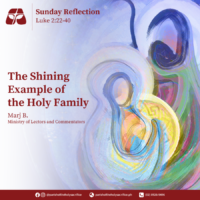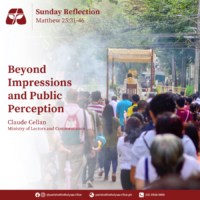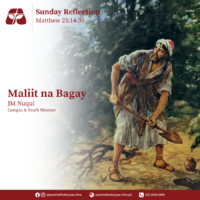Sunday Gospel Reflection
First Sunday of Advent
Luke 21:25-28, 34-36 | Nov. 28, 2021
Starting with the End
Christian Laurence E. Aquino
Ministry of Lectors and Commentators
Don’t you find it strange that the gospel for the first Sunday of Advent from the Gospel of Luke talks about the second coming of Jesus? We’re beginning a new liturgical calendar and yet the theme of the gospel is about the end of times. We’re anticipating the joyful celebration of Christmas and yet we hear the terrifying signs that will happen before the second coming.
I thought it was strange at first, but it only makes sense, that in order to properly begin something, we must have the end in sight.
Advent means “to come” or “to arrive” and this particularly points to Jesus’ coming to our life. And when someone is arriving or coming, we wait. However, we are reminded in today’s readings that our waiting is not passive. Our waiting is actually a preparation. We have to remember the double character of this season, that it not only celebrates the feast of the birth of Jesus, but more importantly, it reminds us to be vigilant and prepared for His second coming which will “catch [us] by surprise like a trap.”
I remember asking an elder when the second coming of Jesus is because I was scared of the signs of the apocalypse (I was a little kid back then), and of course we know that no one knows. However, as I grew up, I realized that while the second coming is indeed inevitable and we will all eventually face the judgment seat of God, there is one practical virtue that may help us “have the strength to escape the tribulations that are imminent,” and that is our attitude toward our own deaths.
The Church teaches us that at the moment of our deaths, we will face our own particular judgment, and this judgment is confirmed in the Parousia, Christ’s second coming. There is a Latin phrase which some of us may have already heard—memento mori (“remember that you will die”). At first, I was hesitating to mention the phrase in this reflection, but I am reminded of the original penitential character of Advent, much like Lent. Many holy people, like Bl. James Alberione and Pope Alexander VII, kept memento mori in their daily prayer life, so much so that some of them even placed a ceramic skull (yes, a skull) in their rooms as a visual reminder that they will die one day. It looks unpleasant, horrible, and morbid at first (just like how scary the signs of the end of times are), but only if we miss the point.
Meditating on our deaths, our personal “end of time,” makes us disposed to live a holy life, which is exactly how we can be vigilant and be prepared for the second coming of Jesus. Living a virtuous life inclines us to do good and live justly so that, with all humility, we may “stand before the Son of Man.”


